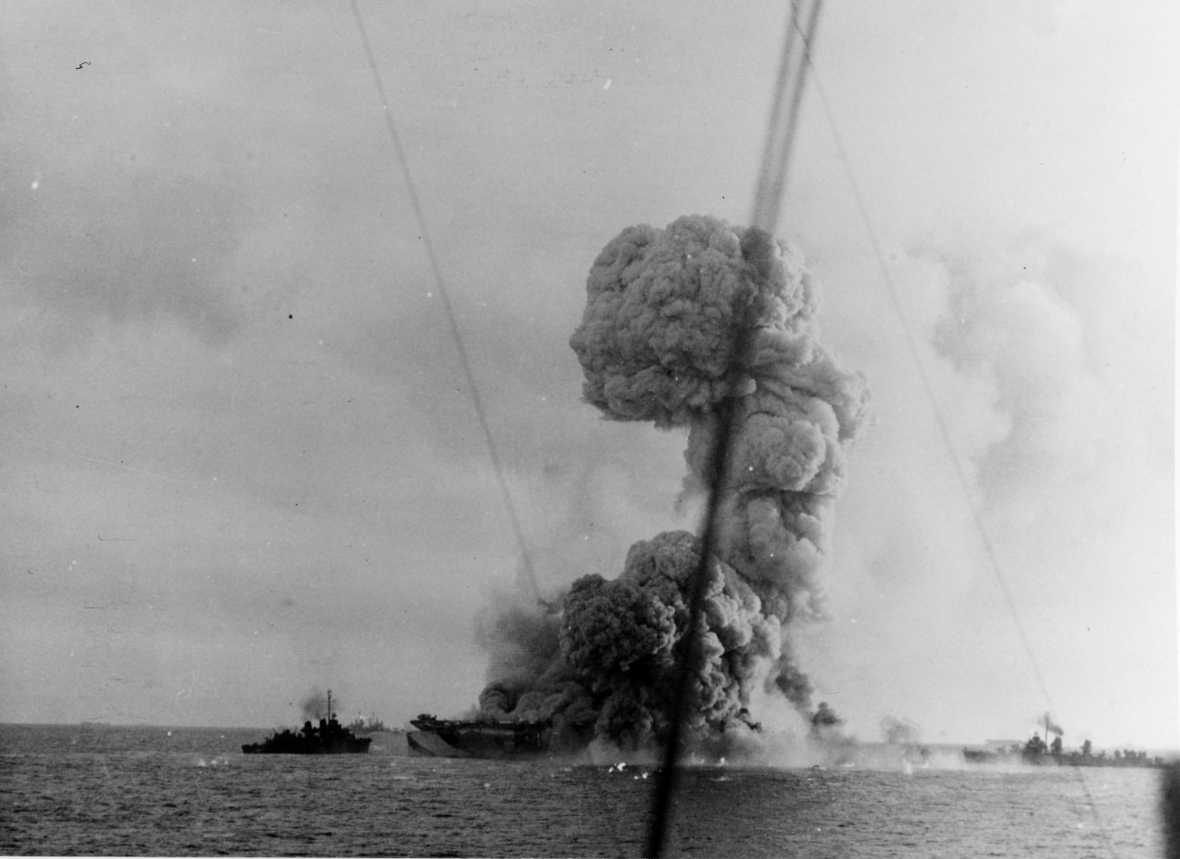By Mass Communication Specialist 1st Class Abigayle Lutz
While operating in the Sulu Sea, Ommaney Bay was hit and eventually mortally wounded by a twin-engine Japanese suicide plane on Jan. 4, 1945.
NHHC’s Underwater Archaeology Branch used a combination of survey information provided by the Sea Scan Survey team and video footage provided by the DPT Scuba dive team, to confirm the identity of Ommaney Bay. This information correlated with location data for the wreck site provided to NHHC in 2019 by Vulcan, LLC (formerly Vulcan, Inc.).
“Ommaney Bay is the final resting place of American Sailors who made the ultimate sacrifice in defense of their country,” said NHHC Director Samuel J. Cox, U.S. Navy rear admiral (retired). “It is with sincere gratitude that I thank the Sea Scan Survey team; Mick Stefurak, Neil “Snake” Krumbeck and Joe Brothers for confirming the location of this wreck site. We would also like to thank the team of Australian divers from DPT Scuba; David Tipping, Chris McCran, Aimee McCran, Samir Alhafith, Heeman Lee and John Wooden for their deep diving expertise and assistance identifying the Ommaney Bay. This discovery allows the families of those lost some amount of closure and gives us all another chance to remember and honor their service to our nation.”
The Japanese kamikaze crashed into Ommaney Bay’s starboard side, releasing two bombs and causing severe damage. A series of explosions were caused by one of the bombs that entered the flight deck and detonated below, among the fully-gassed aircraft in the forward third of the hanger deck. The second bomb exploded close to the starboard side after rupturing the fire main on the second deck and passing through the hanger deck.
The order to abandon ship was given as the possibility of stored torpedo warheads exploding at any moment increased. A total of 95 Sailors were lost, including two personnel from an assisting destroyer who were killed when the torpedo warheads on Ommaney Bay finally went off.
Ommaney Bay received two battle stars for her World War II service.
The wreck of Ommaney Bay is a U.S. sunken military craft protected by U.S. law and under the jurisdiction of the Department of the Navy. While non-intrusive activities, such as remote sensing documentation, on U.S. Navy sunken military craft are allowed, any activity that may result in the disturbance of a sunken military craft must be coordinated with NHHC and, if appropriate, authorized through a relevant permitting program. Most importantly, the wreck represents the final resting place of Sailors who gave their life in defense of the nation and should be respected by all parties as a war grave.
For more information on Ommaney Bay, visit https://www.history.navy.mil/research/histories/ship-histories/danfs/o/ommaney_bay.html
NHHC UAB is responsible for setting policy and managing the U.S. Navy’s nearly 3,000 shipwrecks and over 15,000 aircraft wrecks. They hold maritime archaeological and conservation expertise and are equipped to conduct research on sunken military craft; manage a conservation and curation facility that stabilizes, analyzes, and houses a collection of artifacts recovered from sunken military craft; and engage in an expansive array of public outreach efforts, including partnering with the diving community.
NHHC, located at the Washington Navy Yard, is responsible for preserving, analyzing, and disseminating U.S. naval history and heritage. It provides the knowledge foundation for the Navy by maintaining historically relevant resources and products that reflect the Navy's unique and enduring contributions through our nation's history and supports the fleet by assisting with and delivering professional research, analysis, and interpretive services. NHHC comprises many activities, including the Navy Department Library, the Navy Operational Archives, the Navy art and artifact collections, underwater archeology, Navy histories, 10 museums, USS Constitution repair facility, and the historic ship Nautilus.
--NHHC--
Note to Media: For more information, contact Naval History and Heritage Command Public Affairs Office at 202-433-7880 or nhhc_publicaffairs@us.navy.mil.



